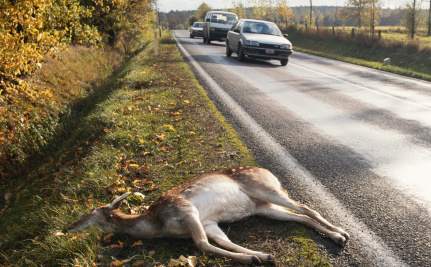
Roadkill For Dinner? Montana Wants To Make It Legal
Beth Buczynski

We’ll all see them. The forsaken carcasses of animals who wanted to cross the road but ended up getting steamrolled by passing traffic. Roadkill is yet another consequence of humanity’s encroachment on the natural world, and it’s even more common in areas where there’s more wildlife than people.
We may shudder or feel sympathy for the poor animal while passing by, but once it’s in our rear-view mirror, few give roadkill a second thought. Some in Montana feel that’s a wasted opportunity.
A bill now working its way through the Montana legislature would make it legal to scavenge game found dead on the highway, take it home, and cook it up for dinner. Shocked? You shouldn’t be. Eating roadkill is already legal in Alaska, Wisconsin, New York, Florida, West Virginia and Illinois, and many others simply look the other way, though it’s technically against the law.
“It really is a sin to waste that good meat when there’s no reason to, when it could be salvaged and somebody could use it,” Senator Larry Jent told Montana Public Radio. And in a time when Americans, on average, waste about 23 pounds of perfectly edible food, per person, every month, it’s hard to argue with his logic.
House Bill 247 would allow a law enforcement official to issue a permit for deer, elk, moose and antelope that are struck and killed by a vehicle. The Department of Fish Wildlife and Parks would still regulate how the carcasses are salvaged.
But isn’t eating roadkill, well, gross?
Maybe to you, but certainly not to everyone. In remote Northern states, roadkill is often deer, moose, elk and antelope–game that’s hunted and eaten without batting an eye. So who cares if it’s a truck or a bullet that did the killing? In Alaska, said roadkill is routinely donated to soup kitchens, and PETA, which opposes most forms of hunting, has actually pushed states to adopt “roadkill salvage” legislation so as not to let animals go to waste.
In fact, as the recent horse meat scandal helped to point out, most of the world is perfectly fine eating meats that Americans consider “gross.” So it would seem that our knee-jerk reaction is more of a cultural norm than a scientific mandate.
But isn’t eating roadkill dangerous?
“The risk is relative depending on the condition of the animal and how it was killed,” said Benjamin Chapman, a food safety specialist with North Carolina State University, in an ABC News story last month. “In roadkill if you happen upon the animal, you don’t know its condition, which makes it riskier than eating regulated food or an animal you’ve hunted.” Then again, Chapman seemed to indicate that unless you see signs of spoilage (like flies and maggots) cooking the meat to an internal temperature of at least 160 degrees should eliminate any chance of illness.
As one might expect, the cattle industry in Montana is none too thrilled with the law, questioning the lack of regulation for salvaged meat. Maybe they see roadkill as competition? After all, even their “regulated meat” can be contaminated and is regularly the source of widespread illness and even death. At least a wild moose or deer won’t have been force fed antibiotics, hormones and possibly other animals its entire life.
